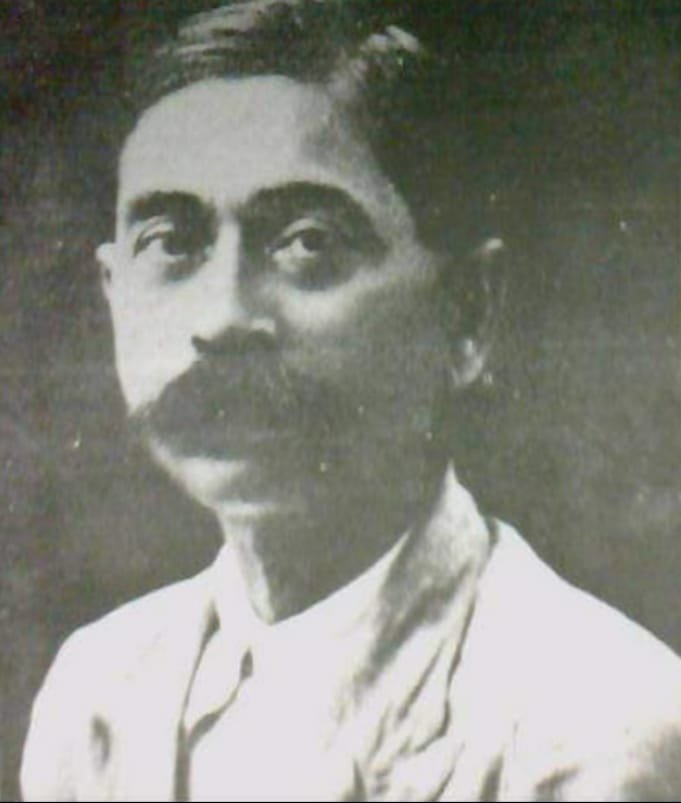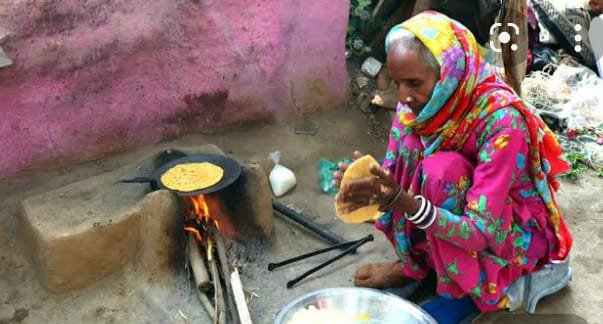
A four-year-old orphan, Hamid was living with his grandmother, Amina, who was barely able to provide him with two square meals a day. His parents were no more, but Amina had told him that his father had left them to earn money, while his mother had gone to Allah to fetch gifts for him.
On the day of Eid, Hamid was also excited like all other children of his age in the neighbourhood. While all were heading to the Eidgah for prayers, children were more excited about the fair to buy sweets and toys. His friends were enjoying themselves with sweets, toys and rides, but not Hamid.
Hamid was also tempted seeing those sweets, rides and toys, but he had only three paise as Eidi. But he didn’t give in. Instead he went to a hardware shop and bought a chimta (a pair of tongs) for his grandmother, who often burnt her hands in the flames while cooking rotis. His granny burst into tears when she came to know about his selflessness.

This simple, poignant and heart-touching story “Idgah” of a little boy’s love for his old grandmother is just one of the several stories and novels written by none other than Munshi Premchand. Hindi literature is incomplete without his mention.
Munshi Premchand was a simple man, whose simplicity, rawness and realism are reflected in his serious stories depicting human emotions and the conditions prevailing in the society at that time. I had read his several stories and novels during my school days. Some of these were parts of my curriculum. It gives a different experience altogether while reading any one from his treasure trove.
Dhanpat Rai Srivastava, who used his pen name first Nawab Rai and then Premchand, was born in Lamhi village of Varanasi in 1880. He studied at Queen’s College, but couldn’t continue his studies after matriculation and started tutoring for a meagre sum, as he faced severe financial difficulties. He married a child widow in 1906. It was considered a revolutionary step at that time. His own story is quite inspiring.
He wrote over 300 short stories including Kafan, Panch Parmeshwar and Shatranj ke Khiladi, and 14 novels including Godan (The Gift of a Cow), Gaban (Embezzlement) and Nirmala.
He also wrote plays, essays, film script and satires against the British Government apart from translating some English titles.
But his work was not appreciated much outside India, as good translations of his work were not made available. He lacked the wherewithal to study or travel abroad.

His life was simple and rough. This is the photograph of Munshi Premchand ji with his wife, in which he was wearing old torn shoes. Seeing this photo, a Hindi litterateur, Harishankar Parsai wrote one article, in which he said,
“I wonder if this is his dress for photo, how will it be for everyday wear! No, this man will not have different outfits. He doesn’t have the quality to change clothes. He is photographed as he is. His outfits cannot change, because he has touched the hearts of the millions of people of India. Behind his simple dress, there is also a tribute to an epic like Godan.”
Premchand believed, “Beauty doesn’t need ornaments, as it can’t bear the weight of ornaments.”
–Kaushal Kishore
I remember this story from school. It’s such a beautiful, timeless tale of love and selflessness. Thank you for sharing!
LikeLiked by 1 person
You’re right, Deepthy, even after so many years, his stories like Panch Parmeshwar and Shatranj ke Khiladi are still fresh in mind. Thank you!
LikeLiked by 1 person
Awesome and very very interesting article on the legendary figure of Hindi Literature, Munshi Premchand. We can learn so much for him. I too remember reading some of his short stories in my Hindi textbook. His stories are fabulous and very realistic. Thanks for sharing this beautiful post. 😊😊😊
LikeLiked by 2 people
I agree with you, Premchand was a different person and author. We may never have one like him. Even after so many decades, his stories carry the same conviction and relevance. Thank you so much. I’m glad you liked the post.😊💐
LikeLike
Beautiful story of Munshi Premchand! He was excellent person in life though very simple. Well shared thanks 👍
LikeLiked by 2 people
I’m happy that you liked the article. There cannot be another Premchand. He was unique. Thanks so much 😊
LikeLike
Yes we read many stories written by him.
LikeLiked by 1 person
Muy interesante. Para mí una cultura a historia muy desconocida.
LikeLiked by 1 person
Me alegro que te haya gustado esta cultura interesante. Muchas gracias 🙏
LikeLike
Thank you, my friend 😊
LikeLike
A truly lovely piece. My brother has the ‘Hamid’ chapter in his hindi book as part of the curriculum.
I remember reading ‘do bailo ki katha’ from Premchand as a kid, and suffice to say, I’m still mesmerized to this day by it. I think none of us can properly describe what was it exactly about his words and their simplicity that made us fall in love so hard with them, but i believe magic can hardly be understood. It’s beyond our comprehension. And Munshi Premchand was nothing but a magician of this universe🙏
LikeLiked by 2 people
You’re right, Shruti, Premchand had the magic in his writings. To my mind, Premchand had lived the life of poverty and deprivation, and he knew every ins and outs. That’s why he used to right with full conviction, pouring human emotions involved. Thank you for sharing your beautiful reflections 🌻
LikeLiked by 1 person
What a wonderful post, KK. Thank you for the introduction. Love the end quote.💕
LikeLiked by 1 person
I’m glad you liked the post and the author. Thank you, Grace 😊💖
LikeLiked by 1 person
I sure did. My pleasure 💕
LikeLiked by 1 person
I enjoy your posts about writers this man is a revelation
LikeLiked by 1 person
So happy to hear that from you. Thank you so much!
LikeLike
You’re welcome
LikeLiked by 1 person
Thank you, Kaushal, for introducing us to wonderful Indian writers. It is a shame that there are not enough translations as I would love to read those uplifting stories of Munshi Premchand.
Joanna
LikeLiked by 2 people
Thank you, Joanna for your interest. I think collections of his stories have been published, also by Amazon with Kindle version. Some of his stories are available free at Google too.
LikeLike
Thank you, Kaushal, I will have a look.
Joanna
LikeLike
A wonderful inspiring post. Thank you for sharing ♥️
LikeLiked by 1 person
So glad you liked it. Thanks so much 💖💐
LikeLike
memories refresh, read Idgah when i was in class 7 ya 8 , could not understand the underlying ethos. As i grew up read some more munshi premchand and realized the pity and sorrow which was so integral to his stories ..do you remember Purdah!
LikeLiked by 1 person
Yes, I have read Purdah and like other stories, his depiction of human emotions is superb. Pity and sorrow are integral parts of life that he himself lived. That’s why his stories are realistic and realities at times are harsh. Thank you for reading and sharing your thoughts!
LikeLiked by 1 person
A heartwarming tale and an intriguing author. Thank you for informing us, KK! ❤ Enjoy your weekend!
LikeLiked by 1 person
It’s my pleasure, truly! You liked it, makes me happy. You too have a great weekend. Thank you 😊💖
LikeLiked by 1 person
I love this story and so appreciate the introduction KK! 💖💖💖 Thanks my friend! 💖
LikeLiked by 1 person
A pleasure to hear that from you, Cindy! Thanks for your appreciation 😊💖💐
LikeLike
Thanks for sharing this, KK. I am always moved by children who loves their grandparents. 🥰
LikeLiked by 1 person
You’re right, this sort of love is so pure and natural. Thank you so much 🥰
LikeLiked by 1 person
I do remember that his stories were included in our urdu curriculum too, don’t exactly remember whether matric or FSc 😃 it’s been long time now.. can’t exactly recall..😃
But very nice story, Eidgah. Loved reading it KK.. nice post👍🙂
LikeLiked by 1 person
You’re right, Saima, Premchand used to write in Urdu too. In fact, his early education was in a Madarsa at Varanasi. I’m glad you liked reading the story. Thanks a lot 😊🤗
LikeLiked by 1 person
A very worthy story teller.
LikeLiked by 1 person
Yes, he was unique in himself. Thank you!
LikeLiked by 1 person
Inspiring write up… I like godaan…read it many times!
LikeLiked by 1 person
I’m glad you liked it. Godan and Gaban are classical reads. Thank you!
LikeLiked by 1 person